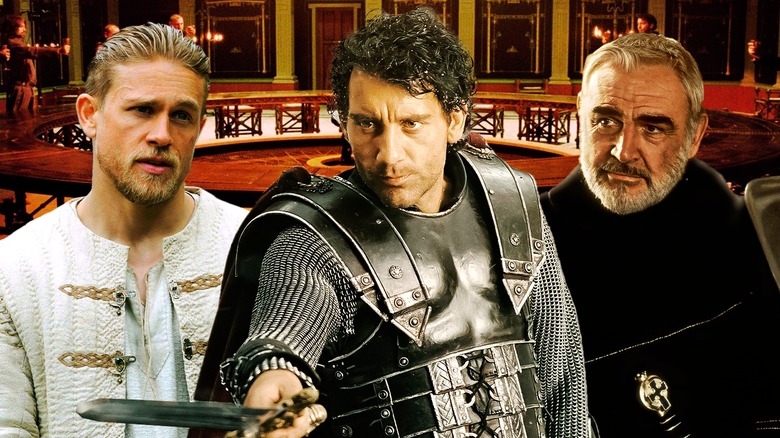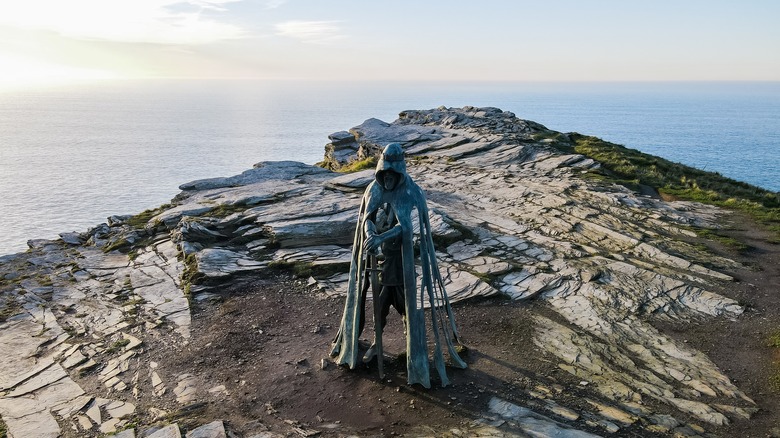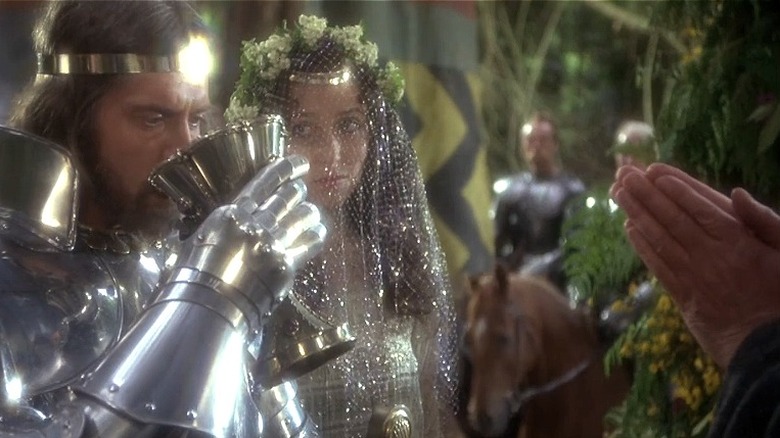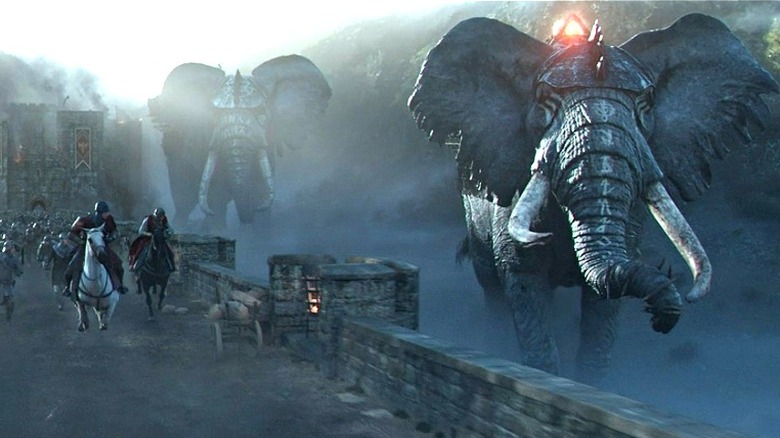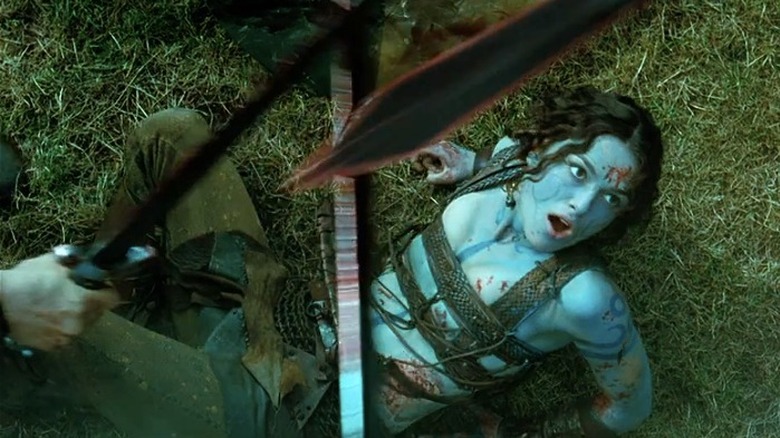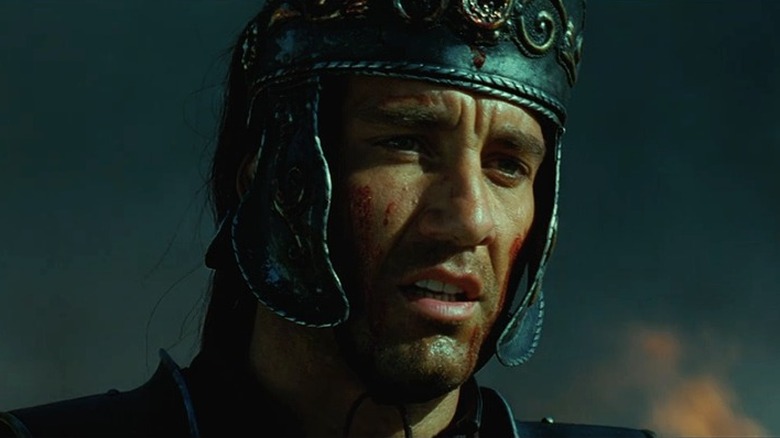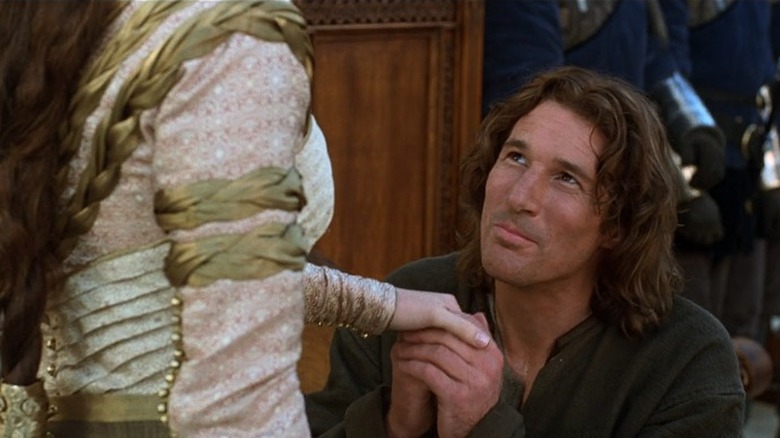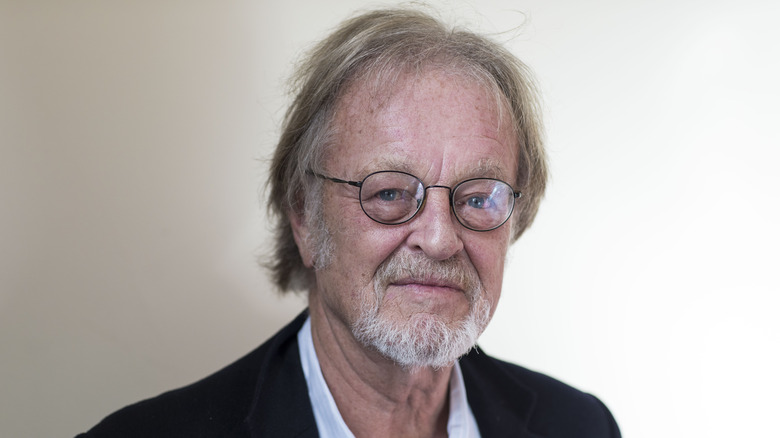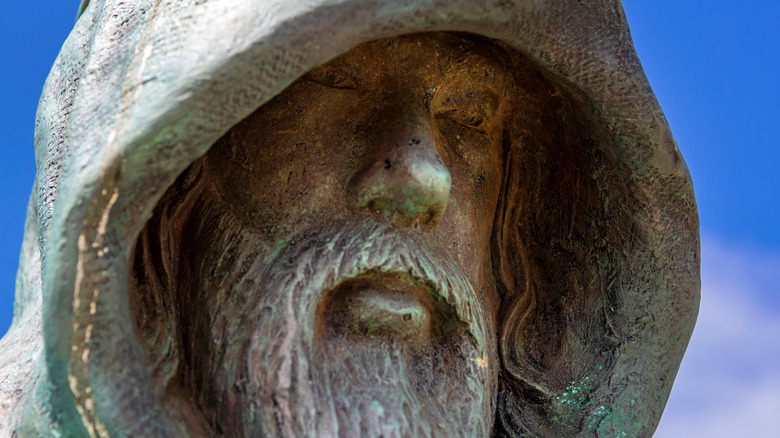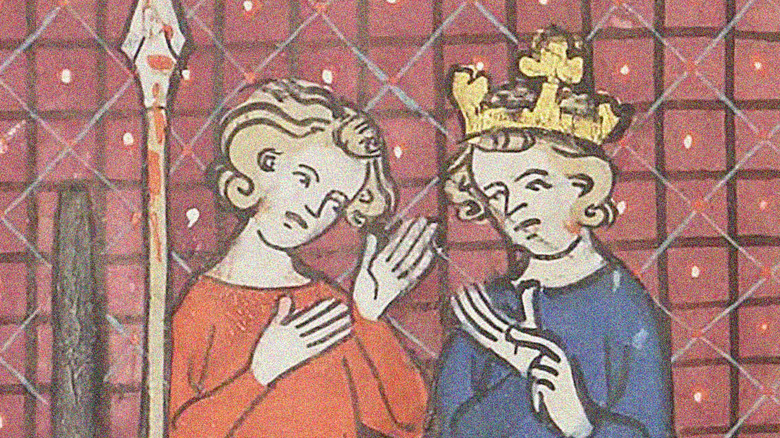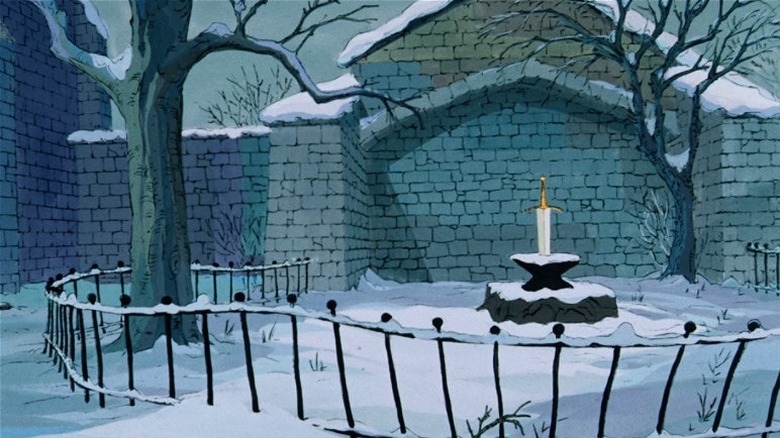Hollywood Just Can't Get King Arthur Right (But Thanks To The Last Kingdom Author, There Is Hope)
You know the story: a "king," a stone, a wizard, a sword, a lake, another sword, some knights, a cup, a table, a princess, betrayals, a battle, a death, and a future resurrection. And you know the story of what happens when Hollywood tackles this tale: "You think you know the story," the trailer will say, "but this is the real one."
Inevitably, it isn't, because there's no such thing as "the real story" when it comes to the knotted mass of mythology, literature, history, and religious and cultural context in which the legend of "King" Arthur is inexorably bound. Despite this, plenty of texts have given us spectacular interpretations, but attempts to lift the legend from the page to the screen have been decidedly less successful. The reasons for this are as countless as the adaptations themselves, but tend to fall into one of three categories.
Firstly, screenwriters are often obliged to simplify and clarify, and Arthuriana is not a sub-genre that lends itself to such reductive pragmatism. Then there's the breadth and continual evolution of the "source material" itself (the Arthur of the 9th century Welsh monk Nennius is not the Arthur of Thomas Malory's "Le Morte d'Arthur" — the basis for most modern-day depictions). Finally, there's the issue of context and subtext, an issue most major productions fail to prioritize at all, much less adapt.
Enter: "The Last Kingdom" author Bernard Cornwell's Warlord Chronicles, and Bad Wolf's upcoming, 10-part adaptation of the trilogy's first novel, "The Winter King." Cornwell's structural, thematic, and historical approach to the narrative conquers each of these aforementioned obstacles, thus paving the way for what might well be "the holy grail" (or, cauldron) of Arthurian on-screen adaptation.
Getting King Arthur right means understanding the context of his creation
Many adaptations place Arthur in a vague, medieval-fantasy-ish England, perhaps because it's easier than explaining the historical, political, and cultural realities of their version of the character. But since this reliance on obscurity creates its own mess of problems, here's a few things to note before we dive in.
Arthur's origins are British — not English. By British, we mean the various Brittonic-speaking Celts of Sub-Roman Britain that would come to be known as "Cymry" (predominantly the modern-day Welsh, but also the Cornish and Breton), and by English, we mean the various Germanic tribes (predominantly the Saxons, but also the Jutes, Angles, etc.) that would come to be known as "English." Many scholars believe that if Arthur was a single individual who actually existed — and not just a symbolic amalgamation — he would have emerged out of Sub-Roman Britain's 5th and 6th century resistance to Saxon invasion and assimilation.
Here's the thing: the Irish (or "Scots," at the time) and the Picts (of modern-day Scotland) were also taking advantage of the fractured, weakened state in which Rome's withdrawal had left Arthur's Britain. Surrounded by threats on all sides, the odds were insurmountable. And yet, historical evidence suggests that for at least a couple generations — or, for "one brief, shining moment," as Professor Dorsey Armstrong puts it, referencing the Kennedy family' use of "Camelot" — someone, possibly even a dude named Arthur, was able to unite his "countrymen," fend off these enemies, and bring peace and stability to the region.
King Arthur can be English, but he can't be ambiguous
To be clear, none of this means that Arthur hasn't been extremely important to English identity, or that he can't be depicted as English (or anything else, for that matter). It simply means that screenwriters have to decide who (or what) their Arthur will be fighting. The issue isn't that so many adaptations get the tradition or history "wrong," but that so few of them see this foundational decision as integral to their story. And without "insurmountable odds" and an ostensibly lost cause, Arthur's story is devoid not only of heroism and romance, but of meaning, as well.
John Boorman's "Excalibur" doesn't trouble itself with such decisions. Instead, Boorman takes the "Kitchen Sink Christ" approach, stuffing his movie with as many King Arthur allegories as he can (but no tangible enemy for most of the film), and subsequently giving us one of the least compelling Arthurs in recent history.
Cornwell's Arthur, by contrast, is heartbreakingly human. But rather than work against the symbolism and subtext of the legend, Cornwell's hyper-specific use of setting, culture, and history succeeds where broader and less contextually-grounded versions have failed. It's through his very relatable humanity that the Arthur of "The Winter King" is able to represent an ideal that is at once specific and historically plausible, and universal and timeless. In other words, he's the opposite of Guy Ritchie's Arthur (Charlie Hunnam) in "King Arthur: Legend of the Sword."
Ritchie's pseudo-Marvel movie King Arthur missed the mark
It's understandably tricky to make Arthur's "big bad" the Saxons in a narrative that positions him as an English hero, but the protagonists and villains of Guy Ritchie's "King Arthur: Legend of the Sword" are so vague that it's difficult to care about either faction. Sure, the linguistic mishmash and laddish flash-forwards feel arbitrary and out of place in this CGI-reliant tornado of fantasy vomit, but they're not even the worst aspect of "Legend of the Sword" (and sadly, they might be the best part). The film isn't set in any particular, real-life era or place. That could work, except that the world we are given is so randomly cobbled together and so scattered and generic in its "otherworldly-ness" that we can't place, relate to, or derive any meaning from it.
Legends like Arthur endure not because of their fantasy, but because of our collective belief in, and need for, their reality. We want to believe in Arthur as if he's a real person, and while that doesn't mean he needs to be "realistic," it does mean we need to see our real-world hopes and struggles reflected in his story. But Ritchie's world provides no such reflection. This isn't fantasy as a mirror, but as a puzzle whose ultimate image is too blurred and busy to comprehend. There's a universe in which Ritchie's film comments on the abusive power that the wealthy wield over the working class, but that universe is not this one.
Lesson for King Arthur movies: if you're going to do history, do it right, and buy a map
Which brings us to writer David Franzoni and director Antoine Fuqua's pile of anachronistic chaos, 2004's "King Arthur." Fuqua's mistake isn't that he keeps things too vague. It's that he tries to be specific and "accurate," but in the most confused — and confusing — manner possible. We can forgive the film for calling the Picts "woads," and for dressing said woads in leather nipple belts. We can even forgive it for weaving 12th century additions to the story into its 5th century narrative, since frankly, no one wants to see an Arthur without a Merlin and a Lancelot.
The rest of this mess, however, is historically unforgivable.
The film opens with the words, "Historians agree that..." — and there's our first issue. Historians don't agree on anything, least of all Arthur, and this inaccurate and inadequate appeal to authority is a sign of things to come. Not only does Franzoni have a Roman elite living several days north of Hadrian's Wall, he also has Saxon tribes invading Britain from the northwest corner of modern-day Scotland. Did these 5th century Saxons come from Iceland? Was their map upside-down? We can't know.
There are other (read: countless) historical and geographical issues here, but they pale in comparison to the film's confused understanding of Sub-Roman Britain.
Franzoni's 5th-century-does-18th century King Arthur is utter chaos
In the 2004 film, Clive Owen's Arthur gallops around shouting about personal freedom while attempting to free his warriors of their service, and poor farmers from the lands they serve. What this Arthur is effectively doing is ensuring these people have no food, no community, no protection in times of war, and nowhere to live. Maybe you don't love your landlord or boss, but if Prince Harry marched into your apartment or office, killed said landlord or boss, and burned down your building or company, your first thought wouldn't be, "Wow, what a great guy!"
There are so many issues with this film — including its half-baked use of C. Scott Littleton and Ann C. Thomas' Sarmation Connection, its complete misrepresentation of Pelagianism, and its whacky portrayal of both the Romano-British and the Picts — that one wonders why it even attempted to call its Arthur historic. Again, there's a universe in which Arthur as a champion of inherent, individual freedom makes sense, but that universe is 18th century France — not 5th century Rome or Britain.
That said, the fact that "King Arthur" at least attempts to give its leader a cause places it firmly above STARZ's failed medieval series, "Camelot" (2011). In this accidental parody of itself, Eva Green's Morgan exists solely to glare, seduce, and serve as a warning about the dangers of female ambition. We're given no reason to care about the series' tween-ish Arthur (a pre-"Stranger Things" Jamie Campbell Bower) save the fact that he is Arthur, and as for the one-dimensional Guinevere (Tamsin Egerton) she's really more prop than person. It's possible "Camelot" had redemption arcs in mind, but if we've learned anything from Vortigern, it's that you can't build on a busted foundation.
The rules of Arthurian engagement
"Camelot" (2011) — like the vast majority of all on-screen Arthurian adaptations — is a bit like watching a first grader recite Shakespeare. The words are there, but the comprehension and delivery are not. Which is ironic, because they usually are there in productions aimed at younger audiences. Adaptations such as Disney's T.H. White-inspired "The Sword in the Stone," for instance, benefit from being forced to think about what the message is in the process of relaying it more simply. Arthurian parodies benefit from this deconstruction process as well (see: the best adaptation to-date, "Monty Python and the Holy Grail").
When more serious adaptations have managed to strike the right balance of subtext, context, history, and plot, it's almost always because they've chosen to focus on a single character or storyline from the wider tradition (e.g., the 1998 NBC miniseries "Merlin," or David Lowery's "The Green Knight"). This is why Jerry Zucker's "First Knight" isn't amongst the worst Arthurian movies ever made. At the very least, "First Knight" focuses on a single element of the legend, and is fairly clear about what its Arthur (Sean Connery) is attempting to create. It also provides a nuanced and relatively historically informed understanding of Chrétien de Troyes' famous courtly love triangle.
Does this mean adaptations can't succeed if they attempt to tell the whole story? No. At least, not if they use their source material wisely, and that source material has already done the 90% of the legwork for them.
Cornwell's King Arthur adaptation strikes a perfect balance
You'd be hard-pressed to find a version of the Arthurian legend that's truer to its historical and cultural origins than Bernard Cornwell's "The Winter King." The Warlord Chronicles are so fully embedded in what little history we know of the time period (right down to the novels' real-world place names and figures), and so thoroughly informed by Brythonic mythology, that it's easy to forget that these are works of fiction written in the mid-1990s. The first-hand account we're given — through the eyes of an aging pseudo-monk named Derfel who was once Arthur's loyal friend — consistently dispels the flowery, poetic notions of the legend long-held by his patron Igraine (the proxy for Cornwell's imagined audience).
Every time Derfel reveals a gap between the legend and his lived experiences, we get the impression that for the first time, we actually are hearing "the real story." Cornwell's trilogy finds a way to historically re-position and ground the well-known elements of Arthuriana, a deconstruction that includes everything from Merlin and Nimue's "magic," to the purely symbolic ritual of placing a sword on a stone, to the origins of the holy grail myth (a Christian re-imagining of cauldron quests in pagan narrative tradition). It's an effective, and easily adaptable, structure. And since Cornwall has already done the immense research required to resolve the historical Arthur with the literary one (and the literary one with the widespread mythology of the literature), the adaptation won't have to wrestle with that aspect unless it decides not to trust its audience.
It also won't have to decide what its Arthur represents. Cornwell's Arthur stories are political in nature, meaning that they speak to the political mechanics of a "just society."
Cornwell makes the purpose of his King Arthur clear
In "The Winter King," Cornwell tells us exactly how his Arthur thinks society should operate. On page 270, it is stated that Arthur believes "a king is only as good as the poorest man under his rule," and that the strong are duty-bound to protect the weak. He believes justice can't exist unless oaths are kept, and the laws of a land apply to every citizen. He believes battles should be fought only to secure peace, and he never creates a round table of perfect knights — only a Brotherhood of Britain that relies on various leaders' putting old grudges to rest in the name of keeping that peace. He's not a king, but a warrior sworn to secure the kingdom of Dumnonia (modern-day Devon and Cornwall) until the infant King Mordred comes of age. His goal is to unite the warring tribes and kingdoms of Britain so they can defend themselves against the Saxons (or, "Sais"), the Irish, and the raiding northern tribes. Pretty straightforward.
It's not particularly romantic to think of Arthur as a "politician," but in the broadest sense of the term, that's precisely what he has to become in order to secure and maintain the peace for which he so desperately long for. Fans of Cornwell's Saxon Stories — from which "The Last Kingdom" was adapted — will see, in this Arthur, an intriguing fusion of Alfred and Uhtred. Like most politicians, Arthur's personal ambitions are in constant conflict with his political ideals, which are themselves (since they are ideals) in constant conflict with reality.
Cornwell's stories make rich ground for a modern-day adaptation to mine, as are the notions of romance, religion, and the past in "The Winter King."
Cornwell's Arthurian conflicts are also our conflicts
Several of Cornwell's characters (most notably Nimue) are undone not just by a zealous belief in their gods or god, but because they're utterly consumed with the resurrection of an idyllic "before" that never really existed. Obviously, these novels weren't written as a response to any recent events or political platforms, and yet, they speak to our current political and cultural divide with ease, despite the hyper-specific setting and storyline. Humanity will always be torn between the devil it thinks it knows (the past), and the devil it doesn't (an unknown future). And when the reality of the past doesn't line-up with the fantasy, its proponents will simply blur the image, as Igraine has her translator Dafydd do anytime Derfel writes something she doesn't like.
So, so, so many adaptations view the romantic longing for the return of a fantasy past as the very essence of Arthur. Crucially, Cornwell's novels engage the foolishness of this delusion, distinguishing between the past as a warning (and guide) vs. and the past as a viable solution to the present (or a path to the future).
If Bad Wolf's adaptation succeeds, it will be because it understands that Cornwell's Arthurian narrative is a story of lenses (one in which we're always vaguely aware of the human fallibility and subjectivity of our narrator) and of tensions (both within the individual and society as a whole). Nowhere are these tensions more apparent than in Arthur's embodiment of them.
The crux of Arthur's enduring appeal is about hope in the face of insurmountable odds
For all his lofty ideology, Cornwell's Arthur himself breaks oaths, fights battles in the name of things other than peace, and can't help but enjoy the thrill of battle. He may be an idealist, but he lives, as we do, in an un-ideal world. That world is ugly, brutal, and continually tests his strength — not with CGI monsters or a crisis of Christian faith — but with a crisis of faith in himself, and by extension, humanity. Like every society that's ever lived, Arthur's triumphs and defeats are cyclical. But to believe in Arthur is to believe that a better version of humanity is possible despite this cycle, even when the odds are insurmountable.
We don't keep resurrecting "the once and future king" because he represents a pretty version of the "once," but because he inspires us to fight for the "future." Fantasy Arthur can't do that in 2023, but Cornwell's Arthur can.
In the second novel, Derfel argues how powerful ideals in an un-ideal world can be: "To hear the tales told at night-time hearths you would think we had made a whole new country in Britain, named it Camelot and peopled it with shining heroes, but the truth is that we simply ruled Dumnonia as best we could, we ruled it justly and we never called it Camelot [...] Camelot exists only in the poets' dreams, while in our Dumnonia, even in those good years, the harvests still failed, the plagues still ravaged us and wars were still fought" ("Enemy of God," p. 201).
It's easy to believe in Camelot. It's infinitely harder — and infinitely more heroic — to believe in and fight for the world in which we actually live. Now we just have to hope this adaptation sees the romance in an Arthur who, through his wholly unromantic humanity, can actually speak to that world.
